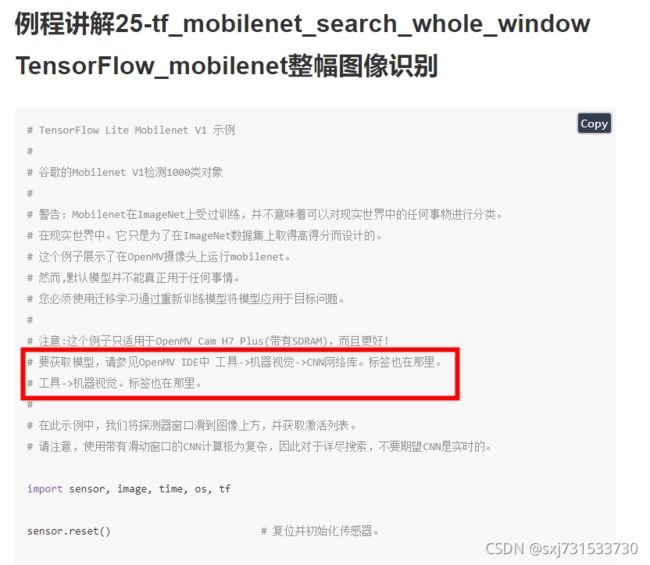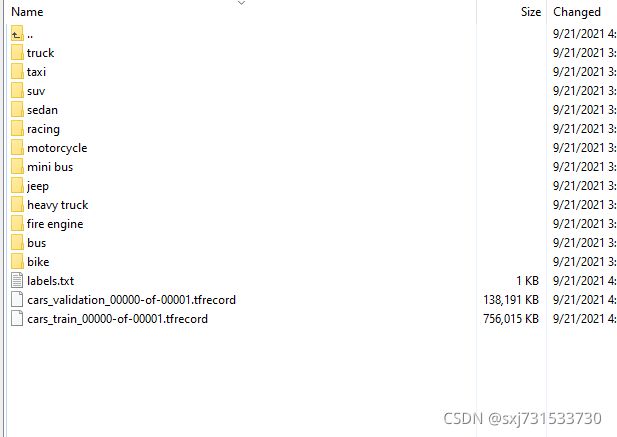23、OpenMV使用tensorflow 1.15.0训练模型mobilenet_v1_1.0_224进行车辆识别
基本思想:希望使用OpenMV调用Tensorflow 的tflite进行目标检测
一、下载window的Openmv的开发工具,软件下载
https://singtown.com/openmv/安装软件之后,进行链接和运行测试即可
测试的画面
帧率还是蛮快的
46.6321
46.6132
46.6284
46.6431
46.6249
46.6392
46.6216
46.6356
46.6185
46.6321
46.6156
46.6289
46.6418
46.6258三、本想使用49、TensorFlow训练模型转成tfilte,进行Android端进行车辆检测、跟踪、部署_sxj731533730-CSDN博客 训练的v3模型生成的tflite直接挪过来,测试,发现跑不通,
又想把18、R329开发板模拟仿真_sxj731533730-CSDN博客 训练的v2模型移植过来,发现也跑不动~~ 仔细查看官方的历程发现这几句注释tf_mobilenet_search_whole_window TensorFlow_mobilenet整幅图像识别 · OpenMV中文入门教程
发现里面全是mobileNet_v1的模型,因此我去tensroflow官网找了一个v1的模型加载openMV试了一下,看看可不可以运行
测试了https://github.com/tensorflow/models/blob/master/research/slim/nets/mobilenet_v1.md 模型是可以运行的
四、开始训练我们自己的模型吧,没有使用它提供的在线训练工具 Edge Impulse~ 原因为啥,数据保密~~~
利用之前的生成的record模型,进行v1的训练,其中搭建环境可以具体具体参考下列两篇博客
18、R329开发板模拟仿真_sxj731533730-CSDN博客 49、TensorFlow训练模型转成tfilte,进行Android端进行车辆检测、跟踪、部署_sxj731533730-CSDN博客
首先检查一下数据集是否标注一一对应
import os
path1 = "G:\\B"
def file_name(file_dir):
jpg_list = []
json_list = []
for root, dirs, files in os.walk(file_dir):
for file in files:
if os.path.splitext(file)[1] == '.jpg':
jpg_list.append(os.path.splitext(file)[0])
elif os.path.splitext(file)[1] == '.json':
json_list.append(os.path.splitext(file)[0])
diff = set(json_list).difference(set(jpg_list))
print("picture ",len(jpg_list))
print(len(diff))
for name in diff:
print("no jpg", name + ".json")
os.remove(path1 + "/" + name + ".json")
diff2 = set(jpg_list).difference(set(json_list))
print(len(diff2))
for name in diff2:
print("no json", name + ".jpg")
os.remove(path1 + "/" + name + ".jpg")
return jpg_list, json_list
file_name(path1)测试结果 (1915 张图片) 按1915*80%算=1532张图片
"C:\Program Files\Python36\python.exe" F:/TFLite_detection_stream.py
picture 1915
0
5
no json 02a43a441f5c71ab9ff8ecab1f33ca49.jpg
no json e8a6241633597e1b7430e0cf5eb06222.jpg
no json 4d3de6244250e35355bd45d83d615379.jpg
no json 2009_000354.jpg
no json 01ab0c4e74e5cefbc25e78e8b2b4b30d.jpg
Process finished with exit code 0然后进行标签文文件对应生成处理
import os
import xml.etree.ElementTree as ET
import shutil
import io
import json
dir = "G:\\B"
for file in os.listdir(dir):
if file.endswith(".json"):
file_json = io.open(os.path.join(dir, file), 'r', encoding='utf-8')
json_data = file_json.read()
data = json.loads(json_data)
m_filename = data['shapes'][0]['label']
newDir = os.path.join(dir, m_filename)
if not os.path.isdir(newDir):
os.mkdir(newDir)
(filename, extension) = os.path.splitext(file)
if not os.path.isfile(os.path.join(newDir, ".".join([filename, "jpg"]))):
shutil.copy(os.path.join(dir, ".".join([filename, "jpg"])), newDir)
elif file.endswith(".xml"):
# with open(os.path.join(root,file), 'r') as f:
tree = ET.parse(os.path.join(dir, file))
root = tree.getroot()
for obj in root.iter('object'): # 多个元素
cls = obj.find('name').text
newDir = os.path.join(dir, cls)
print(newDir)
if not os.path.isdir(newDir):
os.mkdir(newDir)
(filename, extension) = os.path.splitext(file)
if not os.path.isfile(os.path.join(newDir, ".".join([filename, "jpg"]))):
shutil.copy(os.path.join(dir, ".".join([filename, "jpg"])), newDir)
elif file.endswith(".jpg"):
print(os.path.join(dir, file))生成结果(外侧的图片和标注文件可以移走了)
定义描述文件,其实和我之前玩的R329训练方法是一样的18、R329开发板模拟仿真_sxj731533730-CSDN博客
ubuntuu@ubuntu:~/ubuntu/models$ sudo vim research/slim/datasets/car.pycar.py文件内容
from __future__ import absolute_import
from __future__ import division
from __future__ import print_function
import os
import tensorflow.compat.v1 as tf
import tf_slim as slim
from datasets import dataset_utils
_FILE_PATTERN = 'cars_%s_*.tfrecord'
SPLITS_TO_SIZES = {'train': int(1915*0.8), 'validation': int(1915*0.2)}
_NUM_CLASSES = 12
_ITEMS_TO_DESCRIPTIONS = {
'image': 'A color image of varying size.',
'label': 'A single integer between 0 and 4',
}
def get_split(split_name, dataset_dir, file_pattern=None, reader=None):
"""Gets a dataset tuple with instructions for reading flowers.
Args:
split_name: A train/validation split name.
dataset_dir: The base directory of the dataset sources.
file_pattern: The file pattern to use when matching the dataset sources.
It is assumed that the pattern contains a '%s' string so that the split
name can be inserted.
reader: The TensorFlow reader type.
Returns:
A `Dataset` namedtuple.
Raises:
ValueError: if `split_name` is not a valid train/validation split.
"""
if split_name not in SPLITS_TO_SIZES:
raise ValueError('split name %s was not recognized.' % split_name)
if not file_pattern:
file_pattern = _FILE_PATTERN
file_pattern = os.path.join(dataset_dir, file_pattern % split_name)
# Allowing None in the signature so that dataset_factory can use the default.
if reader is None:
reader = tf.TFRecordReader
keys_to_features = {
'image/encoded': tf.FixedLenFeature((), tf.string, default_value=''),
'image/format': tf.FixedLenFeature((), tf.string, default_value='png'),
'image/class/label': tf.FixedLenFeature(
[], tf.int64, default_value=tf.zeros([], dtype=tf.int64)),
}
items_to_handlers = {
'image': slim.tfexample_decoder.Image(),
'label': slim.tfexample_decoder.Tensor('image/class/label'),
}
decoder = slim.tfexample_decoder.TFExampleDecoder(
keys_to_features, items_to_handlers)
labels_to_names = None
if dataset_utils.has_labels(dataset_dir):
labels_to_names = dataset_utils.read_label_file(dataset_dir)
return slim.dataset.Dataset(
data_sources=file_pattern,
reader=reader,
decoder=decoder,
num_samples=SPLITS_TO_SIZES[split_name],
items_to_descriptions=_ITEMS_TO_DESCRIPTIONS,
num_classes=_NUM_CLASSES,
labels_to_names=labels_to_names)同时向同在一个目录下的dataset_factory.py填入对应dataset_map
from datasets import car
....
datasets_map = {
'cifar10': cifar10,
'flowers': flowers,
'imagenet': imagenet,
'mnist': mnist,
'visualwakewords': visualwakewords,
'car':car,
}
五、将处理过的数据集使用winSCAP拖到
/home/ubuntu/models/research/slim/datasets/car修改一下
sudo vim /home/ubuntu/models/research/slim/datasets/convert_dataset_car.py文件内容
# Copyright 2016 The TensorFlow Authors. All Rights Reserved.
from __future__ import absolute_import
from __future__ import division
from __future__ import print_function
import math
import os
import random
import sys
from six.moves import range
from six.moves import zip
import tensorflow.compat.v1 as tf
from datasets import dataset_utils
# The URL where the Flowers data can be downloaded.
# The number of images in the validation set.
_NUM_VALIDATION = 350
# Seed for repeatability.
_RANDOM_SEED = 0
# The number of shards per dataset split.
_NUM_SHARDS = 1
class ImageReader(object):
"""Helper class that provides TensorFlow image coding utilities."""
def __init__(self):
# Initializes function that decodes RGB JPEG data.
self._decode_jpeg_data = tf.placeholder(dtype=tf.string)
self._decode_jpeg = tf.image.decode_jpeg(self._decode_jpeg_data, channels=3)
def read_image_dims(self, sess, image_data):
image = self.decode_jpeg(sess, image_data)
return image.shape[0], image.shape[1]
def decode_jpeg(self, sess, image_data):
image = sess.run(self._decode_jpeg,
feed_dict={self._decode_jpeg_data: image_data})
assert len(image.shape) == 3
assert image.shape[2] == 3
return image
def _get_filenames_and_classes(dataset_dir):
"""Returns a list of filenames and inferred class names.
Args:
dataset_dir: A directory containing a set of subdirectories representing
class names. Each subdirectory should contain PNG or JPG encoded images.
Returns:
A list of image file paths, relative to `dataset_dir` and the list of
subdirectories, representing class names.
"""
flower_root = os.path.join(dataset_dir)
directories = []
class_names = []
for filename in os.listdir(flower_root):
path = os.path.join(flower_root, filename)
if os.path.isdir(path):
directories.append(path)
class_names.append(filename)
photo_filenames = []
for directory in directories:
for filename in os.listdir(directory):
path = os.path.join(directory, filename)
photo_filenames.append(path)
return photo_filenames, sorted(class_names)
def _get_dataset_filename(dataset_dir, split_name, shard_id):
output_filename = 'cars_%s_%05d-of-%05d.tfrecord' % (
split_name, shard_id, _NUM_SHARDS)
return os.path.join(dataset_dir, output_filename)
def _convert_dataset(split_name, filenames, class_names_to_ids, dataset_dir):
"""Converts the given filenames to a TFRecord dataset.
Args:
split_name: The name of the dataset, either 'train' or 'validation'.
filenames: A list of absolute paths to png or jpg images.
class_names_to_ids: A dictionary from class names (strings) to ids
(integers).
dataset_dir: The directory where the converted datasets are stored.
"""
assert split_name in ['train', 'validation']
num_per_shard = int(math.ceil(len(filenames) / float(_NUM_SHARDS)))
with tf.Graph().as_default():
image_reader = ImageReader()
with tf.Session('') as sess:
for shard_id in range(_NUM_SHARDS):
output_filename = _get_dataset_filename(
dataset_dir, split_name, shard_id)
with tf.python_io.TFRecordWriter(output_filename) as tfrecord_writer:
start_ndx = shard_id * num_per_shard
end_ndx = min((shard_id+1) * num_per_shard, len(filenames))
for i in range(start_ndx, end_ndx):
sys.stdout.write('\r>> Converting image %d/%d shard %d' % (
i+1, len(filenames), shard_id))
sys.stdout.flush()
# Read the filename:
image_data = tf.gfile.GFile(filenames[i], 'rb').read()
height, width = image_reader.read_image_dims(sess, image_data)
class_name = os.path.basename(os.path.dirname(filenames[i]))
class_id = class_names_to_ids[class_name]
example = dataset_utils.image_to_tfexample(
image_data, b'jpg', height, width, class_id)
tfrecord_writer.write(example.SerializeToString())
sys.stdout.write('\n')
sys.stdout.flush()
def _dataset_exists(dataset_dir):
for split_name in ['train', 'validation']:
for shard_id in range(_NUM_SHARDS):
output_filename = _get_dataset_filename(
dataset_dir, split_name, shard_id)
if not tf.gfile.Exists(output_filename):
return False
return True
def run(dataset_dir):
"""Runs the download and conversion operation.
Args:
dataset_dir: The dataset directory where the dataset is stored.
"""
if not tf.gfile.Exists(dataset_dir):
tf.gfile.MakeDirs(dataset_dir)
if _dataset_exists(dataset_dir):
print('Dataset files already exist. Exiting without re-creating them.')
return
photo_filenames, class_names = _get_filenames_and_classes(dataset_dir)
class_names_to_ids = dict(
list(zip(class_names, list(range(len(class_names))))))
# Divide into train and test:
random.seed(_RANDOM_SEED)
random.shuffle(photo_filenames)
training_filenames = photo_filenames[_NUM_VALIDATION:]
validation_filenames = photo_filenames[:_NUM_VALIDATION]
# First, convert the training and validation sets.
_convert_dataset('train', training_filenames, class_names_to_ids,
dataset_dir)
_convert_dataset('validation', validation_filenames, class_names_to_ids,
dataset_dir)
# Finally, write the labels file:
labels_to_class_names = dict(
list(zip(list(range(len(class_names))), class_names)))
dataset_utils.write_label_file(labels_to_class_names, dataset_dir)
print('\nFinished converting the car dataset!')
dir="/home/ubuntu/models/research/slim/datasets/car"
run(dir)执行命令
ubuntu@ubuntu:~/models$ python3 research/slim/datasets/convert_dataset_car.py生成的目录结果
六、将下载 https://github.com/tensorflow/models/blob/master/research/slim/nets/mobilenet_v1.md的mobilenet_v1_1.0_224 文件夹移动到文件夹
/home/ubuntu/models/research/slim/datasets训练命令train
ubutnu@ubuntu:~/models$ python3 research/slim/train_image_classifier.py --train_dir=./train_dir --dataset_dir=research/slim/datasets/car --dataset_name=car --dataset_spilt_name=train --model_name=mobilenet_v1 --train_image_size=224 --checkpoint_path=research/slim/datasets/mobilenet_v1_1.0_224/mobilenet_v1_1.0_224.ckpt --max_number_of_steps=30000 --checkpoint_exclude_scopes=MobilenetV1/Logits训练完成
I0921 17:27:12.002618 140244355847936 learning.py:512] global step 30000: loss = 0.0850 (0.183 sec/step)
INFO:tensorflow:Stopping Training.
I0921 17:27:12.012650 140244355847936 learning.py:769] Stopping Training.
INFO:tensorflow:Finished training! Saving model to disk.
I0921 17:27:12.013312 140244355847936 learning.py:777] Finished training! Saving model to disk.
/home/ps/anaconda3/envs/tensorflow/lib/python3.6/site-packages/tensorflow_core/python/summary/writer/writer.py:386: UserWarning: Attempting to use a closed FileWriter. The operation will be a noop unless the FileWriter is explicitly reopened.
warnings.warn("Attempting to use a closed FileWriter. "验证命令vaild
ubuntu@ubuntu:~/models$ python3 research/slim/eval_image_classifier.py --alsologtostderr ---checkpoint=train_dir/model.ckpt-30000 --dataset_dir=research/slim/datasets/car --dataset_name=car --dataset_split_name=validation --model_name=mobilenet_v1 --train_image_size=224 --eval_dir=train_dir/eval验证结果
W0922 08:42:00.008753 139924728133376 deprecation.py:323] From /home/ps/anaconda3/envs/tensorflow/lib/python3.6/site-packages/tensorflow_core/python/training/monitored_session.py:882: start_queue_runners (from tensorflow.python.training.queue_runner_impl) is deprecated and will be removed in a future version.
Instructions for updating:
To construct input pipelines, use the `tf.data` module.
2021-09-22 08:42:01.020176: I tensorflow/stream_executor/platform/default/dso_loader.cc:44] Successfully opened dynamic library libcudnn.so.7
2021-09-22 08:42:02.386257: I tensorflow/stream_executor/platform/default/dso_loader.cc:44] Successfully opened dynamic library libcublas.so.10.0
INFO:tensorflow:Evaluation [1/4]
I0922 08:42:03.114004 139924728133376 evaluation.py:167] Evaluation [1/4]
INFO:tensorflow:Evaluation [2/4]
I0922 08:42:03.205864 139924728133376 evaluation.py:167] Evaluation [2/4]
INFO:tensorflow:Evaluation [3/4]
I0922 08:42:03.469731 139924728133376 evaluation.py:167] Evaluation [3/4]
INFO:tensorflow:Evaluation [4/4]
I0922 08:42:03.855772 139924728133376 evaluation.py:167] Evaluation [4/4]
eval/Accuracy[0.825]
eval/Recall_5[0.7175]
INFO:tensorflow:Finished evaluation at 2021-09-22-08:42:04
I0922 08:42:04.115464 139924728133376 evaluation.py:275] Finished evaluation at 2021-09-22-08:42:04七、生成pb的过程先要生成前导图,然后再给前导图导入参数即可
(1)、创建推理图 需要下载 GitHub - tensorflow/tensorflow: An Open Source Machine Learning Framework for Everyone 代码
ubuntu@ubuntu:~/models$ python3 research/slim/export_inference_graph.py alsologtostderr --model_name=mobilenet_v1 --output_file=./inference_graph_mobilenet.pb --dataset_name=car生成模型
ubuntu@ubuntu:~/models$ python3 ../tensorflow/tensorflow/python/tools/freeze_graph.py --input_graph=./inference_graph_mobilenet.pb --input_binary=true --input_checkpoint=./train_dir/model.ckpt-30000 --output_graph=./frozen_mobilenet.pb --output_node_names=MobilenetV1/Predictions/Reshape_1优化模型
ubuntu@ubuntu:~/models$ python3 ../tensorflow/tensorflow/python/tools/optimize_for_inference.py --input=./frozen_mobilenet.pb --output=./opt_frozen_mobilenet.pb --input_names=input --output_names=MobilenetV1/Predictions/Reshape_1然后使用脚本生成tflite模型
import tensorflow as tf
# 需要配置
in_path = r"frozen_mobilenet.pb"
# 模型输入节点
input_tensor_name = ["input"]
input_tensor_shape = {"input": [1, 224, 224, 3]}
# 模型输出节点
classes_tensor_name = ["MobilenetV1/Predictions/Reshape_1"]
converter = tf.lite.TFLiteConverter.from_frozen_graph(in_path,
input_tensor_name, classes_tensor_name,
input_tensor_shape)
converter.allow_custom_ops = True
converter.post_training_quantize = True
tflite_model = converter.convert()
open("output_detect.tflite", "wb").write(tflite_model)
print("done")测试openMV
我数据集图片是网上爬虫爬的 不是太好 ,有点慢 待调查原因
附录:训练一个轻量级模型 mobilenet_v1_0.25_128
ubuntu@ubuntu:~/models$ python3 research/slim/train_image_classifier.py --train_dir=./train_dir --dataset_dir=research/slim/datasets/car --dataset_name=car --dataset_spilt_name=train --model_name=mobilenet_v1 --train_image_size=128 --max_number_of_steps=30000 --checkpoint_exclude_scopes=MobilenetV1/Logits生成模型 优化模型 生成tflite 命令参数一样









